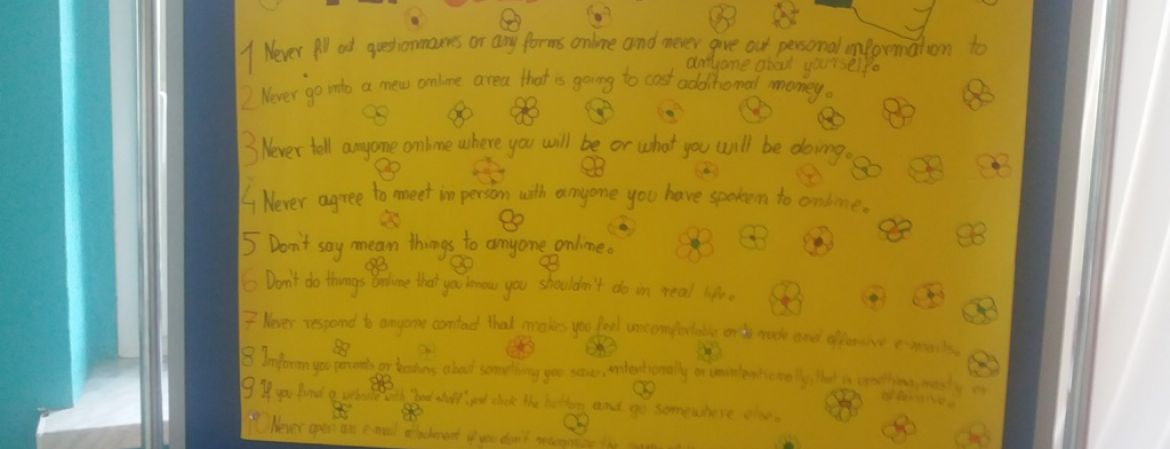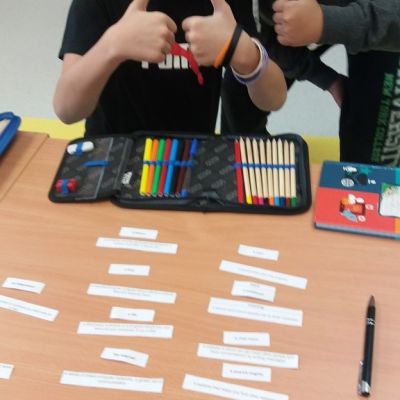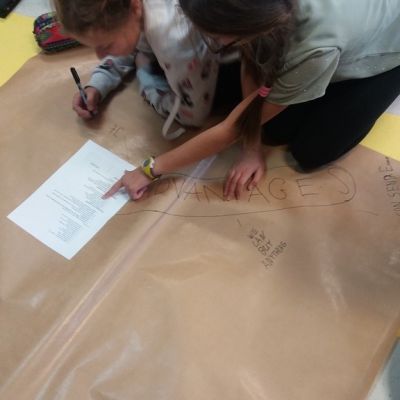
- OPUBLIKOWANO
- 17 marca 2018
Scenariusz zajęć w klasie
Scenariusz lekcji z języka angielskiego
Dla klasy VII - szkoły podstawowej w ramach udziału w projekcie: “Jesteśmy Cyfrowobezpieczni”
Temat lekcji: We are safe in the net (2 jednostki lekcyjne)
I.Cele lekcyjne:
Cel strategiczny lekcji:
- przedstawienie zagrożeń płynących z korzystania z Internetu, sposobów zapobiegania im i reagowania.
Cele dydaktyczno-wychowawcze:
- rozwijanie słownictwa związanego z komputerem,
- rozwijanie umiejętności wypowiadania się na dany temat,
- kształtowanie umiejętności krytycznego spojrzenia na Internet, - uświadomienie pozytywnych i negatywnych aspektów korzystania z Internetu,
- zapoznanie z zasadami bezpiecznego korzystania z Internetu.
Cele operacyjne:
Po zakończonej lekcji uczeń znać;
- słownictwo dotyczące pracy z komputerem i Internetem, niektóre symbole używane w e-mailach, pozytywne i negatywne strony korzystania z Internetu, podstawowe zasady bezpiecznego użytkowania Internetu;
Rozumie:
- zagrożenia związane z używaniem Internetu, konieczność przestrzegania zasad bezpiecznego korzystania z Internetu;
Potrafi:
-używać właściwego słownictwa związanego z komputerem, odpowiedzieć na pytanie Why do you use the Internet? (Dlaczego używasz Internetu?), wskazać korzyści i zagrożenia związane z używaniem Internetu, sformułować kilka „złotych zasad” bezpiecznego korzystania z Internetu, bezpiecznie korzystać z Internetu, w razie zagrożenia odpowiednio zareagować.
- Metody i formy nauczania:
- praca jednym frontem w klasie, praca w parach,
dyskusja, burza mózgów, uzupełnianie ćwiczeń. projekt plakatu.
III. Środki dydaktyczne wykorzystywane w czasie zajęć:
- rozsypanka (wyraz i jego definicja), rozsypanka (symbol i jego znaczenie), duży poster i małe diagramy do wypełnienia przez uczniów, „złote zasady” korzystania z Internetu.
- Ogólny plan lekcji:
- Czynności wstępne – 3 minuty
- Rozgrzewka (warm-up) – uczniowie podają czasowniki, rzeczowniki, przymiotniki związane z komputerami
- Rozwijanie słownictwa (follow-up the vocabulary) – uczniowie dopasowują definicje związane z komputerami z odpowiednim słowem.
- Ćwiczenie dodatkowe (extra activity) – uczniowie rozpoznają lub odgadują znaczenie symboli używanych w e-mailach lub SMS-ach
- Mówienie (speaking) – uczniowie udzielają odpowiedzi na pytania Why do you use the Internet? utrwalając w ten sposób infinitive of purpose
- Dyskusja w klasie (discussion) – Jakie są korzyści i niekorzyści z używania Internetu? (What are the advantages and disadvantages of using the Internet?)
- Uczniowie wypełniają poster i przygotowane diagramy.
- Przedstawienie ten golden rules – dziesięciu złotych zasad korzystania z Internetu – uczniowie uzupełniają je podanymi czasownikami (filling in the gaps).
- Podsumowanie (conclusion) – zwrócenie uwagi na zagrożenia płynące z Internetu i sposoby reagowania na nie.
- Przygotowanie przez uczniów 10 złotych zasad w formie plakatu informacyjnego na kory
tarzu szkolnym.
- Przebieg lekcji:
1) Greet students.
2) Check the list of students.
3) Give and explain the topic of the lesson.
1) Ask students to make a list of words connected with computers.
2) Divide the blackboard into 3 columns.
3) Ask students to write down the words in an appropriate column (as in the example).
VERB | NOUN | ADJECTIVE |
to start up to log on to surf to print to connect to crash to chat to dial to use to operate to play to join to switch on/off to check to delete to reset to respond to enter to click etc | a screen a keyboard a mouse a mouse pad a modem a printer a disk a CD ROM a window a joystick a website a memory an e-mail the Internet a message an attachment a computer virus/bug a file a button software hardware | online active inactive bugged labeled useful addicted dependent on obsessive offensive mean nasty etc. |
1) Give students the set of words and their definitions on a separate slip of paper.
2) In pairs, students match the words or phrases with their definitions.
3) Check them with the whole class. (Print the chart on the thick paper, cut it into pieces, put them into one envelope – one set for the pair of students)
word |
meaning |
a password
| a secret word which people use to enter websites |
a user
| a person who uses the Internet |
a chat room
| a website in which we can meet other people and have conversations by writing messages |
a search engine
| a website that helps you find other websites |
software
| a set of programs that you put into a computer when you want to do particular jobs |
hardware
| a computer and the equipment (a keyboard, a modem, a printer, a mouse etc.)
|
an attachment
| a written document or a picture you send with an e-mail |
a bug
| a special computer program which infects computer files and destroys them
|
the Internet
| a series of linked computer networks, a global net of communication
|
People use symbols to send messages to each other.
1) Give the students a set of symbols and their meanings on a separate slip of paper.
2) Ask students, in pairs, to match them.
3) Check them with the whole class. (Print the chart on the thick paper, cut it into pieces, put them into one envelope – one set for the pair of students)
symbol | meaning |
:-)
| I’m happy. |
:-{) | I’ve got a moustache. |
:-)> | I’ve got a beard. |
:-i | I’m a smoker. |
:+) | I’ve got a large nose. |
(:-) | I’m bold. |
:-( | I’m sad. |
8-) | I wear glasses. |
>:-( | I’m furious |
. :-O | I’m in a shock. |
1) Ask students “Why do you use the Internet?”
2) Discuss this briefly with the whole class. Practice the infinitive of purpose.
I use the Internet …
Students answers for example: to find some useful information to play computer games to do my homework to chat with friends
Students answers for example:
-to find some useful information
- to play computer games
- to do my homework
- to chat with friends
- to make new friends in a chat room
- to surf the net for fun
-to print pictures, photos to send e-mails
- to do the shopping on-line
- to sell books and CDs
- to listen to music
- to exchange computer messages to spend my free time to exchange opinions in a chat room to look for the information to join the discursive group on-line, etc.
1) Display the empty poster on the blackboard.
2) Ask students “What are the advantages and the disadvantages of using the Internet?”
3) Note the ideas on the blackboard.
4) Compare them, combine and choose 8 advantages and 8 disadvantages.
5) Write them on the poster.
6) Students make their own small posters in the notebooks or fill in the small copies prepared in advance by the teacher.
7) Display the big poster on your class notice board.
Advantages (for example):
❖ It is easy to operate.
❖ We can find useful information
❖ . We can send and receive e-mails.
❖ We can buy or order products online.
❖ It helps to do our homework.
❖ We can meet new people.
❖ It is uncensored; everyone can say everything.
❖ It is the fastest way of communication.
Disadvantages (for example):
❖ We can get rude or offensive e-mails, messages.
❖ Some people pretend to be different people online.
❖ People say mean, nasty things online.
❖ We can be addicted to the Internet.
❖ It is expensive.
❖ The computer may be infected by the computer bugs.
❖ There is a lot of rubbish.
❖ It’s a waste of time.
1) Give students “Ten golden rules”.
2) Ask students to fill in the gaps with the verbs.
3) Go through the answers with the whole class.
4) Discuss them pointing to the threats and how students should react to them.
SAFE SURFING FOR TEENAGERS
TEN GOLDEN RULES
- Never …………….. questionnaires or any forms online and never give out personal information to anyone about yourself.
- Never ……………… a new online area that is going to cost additional money.
- Never ……………… anyone online where you will be or what you will be doing.
- Never ……………… to meet in person with anyone you have spoken to online.
- Don’t …………. mean things to anyone online.
- Don’t …………. things online that you know you shouldn’t do in real life.
- Never ………….. to anyone contact that makes you feel uncomfortable or to rude and offensive e-mails.
- …………… your parents or teachers about something you saw, intentionally or unintentionally, that is upsetting, nasty or offensive.
- If you …………. a website with “bad stuff”, just click the button and go somewhere else.
- Never open an e-mail attachment if you don’t ……………….. the name of the sender.
agree, do, fill out, find, go into, inform, recognize, respond, say, tell
|
materiały z Internetu
mgr Agata Palak - ZSP Zarzecze
- AUTOR ZDJĘĆ
- Palak Agata






